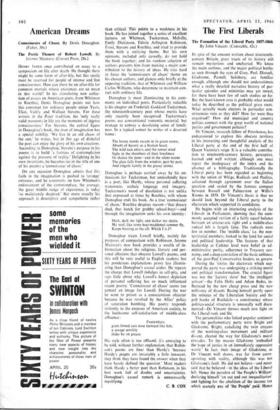American Dreams
HENRY JAMES once contributed an essay to a symposium on life after death. He thought there might be some form of after-life, but this surely must be reserved for people of intense and fine consciousness. How can there be an after-life for common mortals whose existences are so mean in this world? In his stimulating new collec- tion of essays on American poets, from Whitman to Roethke, Denis Donoghue points out how this contempt for ordinary people unites Yeats, Eliot, Valery and Wallace Stevens. For these writers in the Pater tradition, the 'only really valid moments in life are the moments ofiiiense consciousness.' For Stevens, the central figure in Donoghue's book, the man of imagination has a special nobility. 'We live in an old chaos of the sun,' he writes, but in this age of disbelief the poet can enjoy the glory of his own creations. According to Donoghue, Stevens's purpose in his poems is to build 'a fortress of contemplation against the pressure of reality.' Delighting ikhis own inventions, he becomes (as in the title of one of his poems) a 'connoisseur of chaos.' • On one occasion Donoghue admits that this faith in the imagination is pushed to 'strange' extremes, and he comments on how Whitman's endorsement of the commonplace, the average, the great middle range of experience, is today `so maliciously despised' But more usuallyltis approach is descriptive and sympathetic rather than critical. This points to a weakness in his book. He has joined together a series of excellent lectures on Whitman, Tuckerman, Melville, Emily Dickinson, Edwin Arlington Robinson, Frost, Stevens and Roethke, and tried to provide them with a unifying theme. But his own opinions, included only casually, do not hold the book together; and his random selection of authors prevents him from making a major con- tribution to the history of ideas. He tries hard to force the 'connoisseurs of chaos' theme on his chosen authors, and glances only briefly at the opposing tradition, that of Whitman and William Carlos Williams, who determine to maintain con- tact with ordinary life.
Donoghue is most illuminating in his com- ments on individual poets. Particularly valuable is his chapter on Frederick Goddard Tuckerman, the nineteenth-century poet whose merits have only recently been recognised. Tuckerman's poems use conventional romantic material, but manage to convey a desolating sense of loneli- ness. In a typical sonnet he writes of a deserted home:
The house stands vacant in its green recess, Absent of beauty as a broken heart.
The wild rain enters; and the sunset wind Sighs in the chambers of their loveliness Or shakes the pane—and in the silent noons The glass falls from the window, part by part, And ringeth faintly in the grassy stones.
Donoghue is perhaps carried away by his en- thusiasm for Tuckerman, but undoubtedly here is a poet, like Hardy, whose personal suffering transmutes archaic language and imagery. Tuckerman's mood of desolation is not unlike that expressed at times by Roethke, with whom Donoghue ends his book. As a true 'connoisseur of chaos,' Roethke despises reason—`that dreary shed, that hutch for grubby school-boys'—and through the imagination seeks his own identity : Dark, dark my light, and darker my desire. My soul, like some heat-maddened summer fly, Keeps buzzing at the sill. Which I is 1?
Donoghue treats Lowell briefly, mainly for purposes of comparison with Robinson. Jerome Mazzaro's new book provides a wealth of in- formation about the religious, literary and per- sonal allusions that obscure Lowell's poems, and this will be very useful to English readers; but his ponderous explanations prove less illumin- ating than Donoghue's casual asides. He repeats the charge that Lowell indulges in self-pity, and says little about why Lowell's honest depiction of personal suffering has so much influenced recent poetry. 'Connoisseur of chaos' seems too genteel as image for Lowell. During the war he went to prison as a conscientious objector because he was revolted by the Allies' policy of saturation bombing. His poetry responds violently to the excesses of American society, to the loathsome self-satisfaction of middle-class affluence: Everywhere,
giant finned cars nose forward like fish; a savage servility slides by on grease.
His style often is too offhand; it's annoying to be told, without further explanation, that Robin- son's poems are finer than Hardy's 'because Hardy's poejns are invariably a little innocent, they think they have found the answer when they have barely defined the question.' Most readers think Hardy a better poet than Robinson, in his best work full of doubts and uncertainties. Donoghue's casual remark is unnecessarily mystifying.
C. B. COX






























 Previous page
Previous page